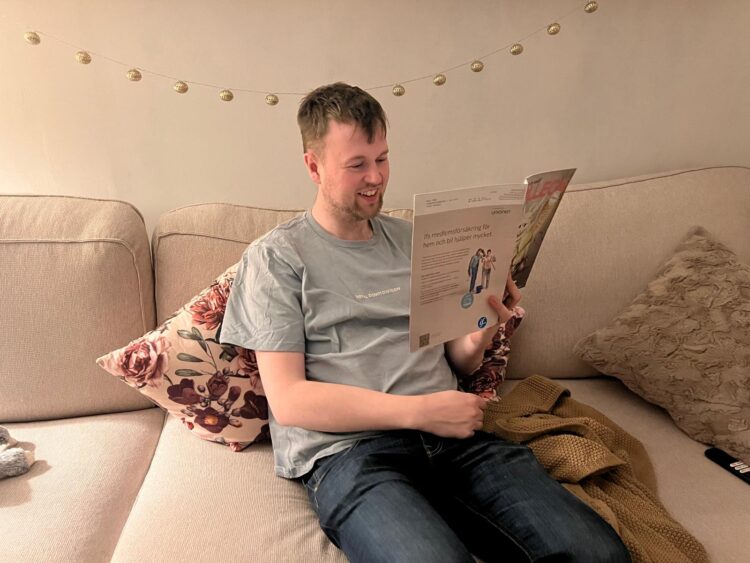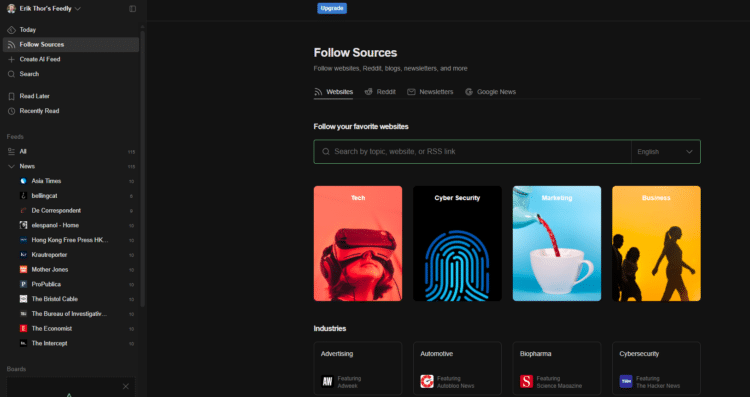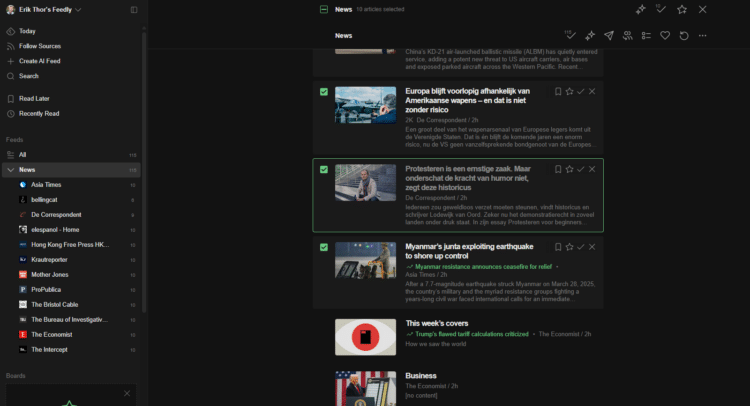We live in a time of drastic geopolitical shifts, played out often in the form of temper tantrums by our political leaders. In times like these, we might feel at a loss on what to do, where to invest, and how to feel about the state of the world. You might be wondering what is going on. In this article, I will help you clean your feeds of newspapers and shallow, superficial social media and how you can replace and realign your attention on stories that really help you understand the world.

A lot of things are happening right now. There’s a lot to take in and understand. The modern media isn’t making that answer any easier for you. If you live in the West, you might pride yourself on having access to a media that is factually accurate. That’s true with an asterisk.
In my opinion, the European media is reactive, lazy, and superficial. Though generally correct in its reporting, it will cherry-pick data and numbers, it will exaggerate, and it’s not beyond using clickbait to get your attention. You probably know this and think you’re beyond it. You can scroll past the sensationalism and get to the juicy, meaningful parts. But ask yourself this:
Does Western media give me a big-picture view of the situation?
Does Western media help me form an in-depth understanding of different actors, their motives, and underlying reasons?
Does Western media provide me with nuanced and original perspectives on a situation?
How Western media made me feel
While feelings aren’t the entire truth, it’s important to ask yourself how reading the news makes you feel. If you feel like the world has gone insane – like nothing makes sense, everyone around you is an idiot, and nothing ever goes right in the world- that’s by design. If we had any foresight, nothing that has happened today would be surprising or unexpected; it’s only portrayed as such.
Take, for example, the election of Trump. Everyone knew he was going to be elected a year before the election even took place. The stock market had already hedged their bets- fossil fuels were up, renewables were down- months before he was voted in. We had six months past the election to prepare for his reforms, and his policies and platform were clearly written and spelled out for us.
We had all the information to know what was going to happen long before it came to take place, but it was not reported to us, we didn’t make the necessary preparations, and we didn’t adjust our policies or our financial decisions. (Well, my friend, an economist, knew about the coming crash in August and told me to sell my stocks by February at the latest). The point is that the news has been highly reactive. Trump’s actions are portrayed as scattered, unplanned, spontaneous whims seemingly coming out of nowhere. The average reader will think this all is unexpected, but then remember that news operates according to a psychological principle:
News and journalism are about what is shocking and unexpected. The cognitive bias of humans is to seek to read or learn more about what is new or unusual. This is why news operates according to its own bias. Even if the news is accurate, it can portray facts in a sensational, unexpected, and shocking light, hijacking the reader’s attention. It can write an article that is so outrageous your brain says you have to read this.
How to get out of the Bermuda Triangle of drama
Overconsumption of media and journalism, then, will have you stuck in the Bermuda Triangle of drama. Look here, what that stupid far-right politician said!
Oh, look at the stupid thing that guy on the left said in response!
Oh wow, now look at this story about a lady that hurt a puppy!
Reading the news will leave you feeling like you’re being tossed around like a pinata from one outrageous experience to another. It’ll make you feel like the world has gone insane. But that’s by design.
And there’s a way out.
The first step is admitting that you’re being manipulated.
Notice the dramatic music when a news segment comes on. Notice how it’s clipped and edited. Notice how words and actions are taken out of context. Spot how journalists will focus on the surface of what something looked like and not what was intended. Look at the action of what happened, but not the underlying reason behind why it happened.
How much time would you spend with a friend that never told you why? How? And because? Most of us avoid shallow, superficial friendships. We don’t like being lied to. We don’t like hyperbole and overreactions. Similarly, if we feel that a newspaper repeatedly exaggerates claims, it’s time to start looking for a better read.
The second step is realizing this is happening.
In most parts of the Western world, people have stopped paying for the news. What happens when you read a paper you’re not paying for? If a newspaper is free, that means you’re the product. The news is selling you a story they’ve been paid to write for you by powerful interests. Technological oligarchs can fund some of these stories, some by automakers, some by health corporations, and others by big banks and think tanks. Another part is paid by advertisers, who pay to get you to buy their products. If you’re buying things you don’t need, if you own the latest iPhone and other tech gadgets, if you’re switching clothes every new season, that’s by design. This is how modern journalism is funded. Now, how is it sourced?
Because it’s expensive to do real journalism, most newspapers rely on reposts from TT, Reuters, or other media aggregators. Have you ever wondered why almost all newspapers use almost exactly the same stories and headlines? In Europe, we live in a uniformistic world order, where all papers share the same stories, leading to most voters flocking towards similar proposals. There’s no critical discourse – no questions – most papers unilaterally agree on what’s right and what is wrong, and what should be done. Even the opinion pieces are often sponsored.
The worst part is the news aggregators.
These services make your reading experience more convenient, providing a quick filtered feed. But they’re not doing any real journalism – they’re just stealing and selling other people’s work off to you. I’ve done experiments. Ground News was the best one I tried – offering to share with you some information of the bias of an article. It can help you understand the difference between the left and right. What it taught me is that the difference is not as big as you think.
The third step is realizing there are alternatives.
Nonfiction books, in-depth journalism, and deep-dive magazines, done by crowdfunded journalism, paid for by the reader, for the reader, offer a positive alternative. The news is about what is unexpected and outrageous. But there are plenty of people – scientists, independent podcasts, bloggers, and freelance journalists- trying to cut through the noise and tell you a real story.
A real story follows an in-depth narrative. It’s often longer to read, but it’ll make you feel full and satisfied, while traditional newspapers will leave you hungry for more answers. Long, in-depth, reader-funded journalism pays off. But you have to be ready to pay for it. If you want to understand what’s happening in the world, if you want an unfiltered, real story, you have to invest in people who are willing to talk about it. We could afford to read newspapers in the past, and we can afford to do so today.
That’s why I recommend getting a paid subscription for a news source with a proper paywall. That paywall is not just there to keep you out. It’s there to keep a certain psychology out. When a paper says, “You have to pay to read this article,” that means that the paper genuinely believes the story has value to the world.
I’ve found some positive alternatives.
I read Dutch De Correspondent. What do I love about it? Everything. I’m able to listen to it as a podcast. The fact that most articles are 10-25 minutes long. The fact is that the stories always feel original and thought-provoking. The commitment to telling the truth. I also read Asia Times. I’ve set up my news Feed using Feedly, which combines news from different sources, and that’s how I get a mixed, broader perspective. Here are some articles I’m currently looking at. If you have any other suggestions, I’m happy to hear them. If they’re in a foreign language, I’m happy to translate them.
What I find really cool is hearing original perspectives from people in the country – hearing the real story straight from the source. International news reporting is usually the least accurate – and the most superficial. I’ve heard so many people tell me things about Sweden that are eventually found to be exaggerated – based on a specific city or something completely out of context. And I’m tired of being told the stereotypes. I want to know the why, the how, and the because of something, not just the what. I want news to be like health food – slow to digest but great for the soul. And I’m ready to pay for people that can fill my life with thought provoking, beautiful stories, which teach me something I don’t know about the world.
Crowdfunded News Organizations
Here’s a list Gemini AI gave me of some interesting newspapers you can explore in different parts of the world. I’m just exploring and would happily take any of your recommendations!
| Organization | Country | Primary Language(s) | Main Focus/Mission |
|---|---|---|---|
| De Correspondent | Netherlands | Dutch, English (partly) | In-depth, contextualized journalism; rejects daily news cycle |
| ProPublica | USA | English | Investigative journalism exposing abuses of power |
| The Bristol Cable | UK | English | Community-owned local journalism; empowers marginalized voices |
| Krautreporter | Germany | German | Explanatory journalism; engages readers in reporting |
| Bellingcat | Netherlands | English, Multiple | Open-source and social media investigations; fact-checking |
| Hong Kong Free Press | Hong Kong | English | Impartial coverage of Hong Kong; resists censorship |
| Block Club Chicago | USA | English | Neighborhood-focused news for Chicago |
| El Español | Spain | Spanish | Digital newspaper with a focus on quality journalism |
| Republik | Switzerland | German | In-depth reporting and analysis of Swiss politics, economics, and culture |
| Mother Jones | USA | English | Left-wing investigative journalism on politics, environment, human rights, culture |
| The Bureau of Investigative Journalism | UK | English | In-depth investigations holding power to account |
| Reveal (CIR) | USA | English | Investigative radio show and podcast focusing on accountability and justice |
| The Intercept | USA | English, Portuguese | Fearless, adversarial journalism; transparency and accountability for the powerful |
Building your custom feed
You can build your custom news feed. It’s more interesting than anything Facebook will ever tell you. I even use it to follow Instagram and other social media accounts.

This is how my feed looks like on the computer.

I recommend getting a custom feed, like Feedly, Feedbin, or Inoreader. This is a part of becoming your algorithm. Instead of relying on an aggregator that tells you what you should read, you decide what stories interest you. If you find that a news feed that you added isn’t telling you any interesting stories, you can remove it from your feed. The benefit of your custom feed is that you can have it on your iPhone, as a widget on your home screen, and on your computer. You can also use it to follow blogs, podcasts, and YouTube channels that you enjoy.
Anything is possible. And you get to decide what you like – and what you want to engage in. I recommend tuning out of and ignoring all newspapers that rely on clickbait to get your attention. If they have to scream and exaggerate to get you to care, the story is probably not going to be that interesting. I also recommend that you screen how you feel after reading an article – did you find it interesting? was it relevant? and did it help you understand the world a little bit better?

